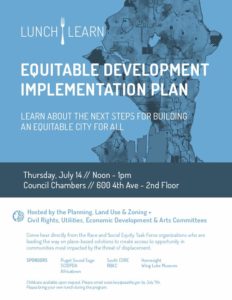Myers Way Property Update; Lunch and Learn on Equitable Development; 2017-2018 City Council Budget Process
Myers Way Property Update
On Thursday, June 30, Financial Administrative Services (FAS) hosted a public meeting to discuss the Draft Preliminary Recommendation Report on the proposed sale of the Myers Way Property. This issue is important to many residents residing in Top Hat, Highland Park, South Park, Arbor Heights, as well as citywide environmental groups such as Seattle Green Spaces Coalition and TreePAC.
 Those in attendance asked for assurances from the City that the decision about selling this property will occur only after the entire community, specifically low income renters, people of color and non-English speaking residents are meaningfully engaged. Residents are asking that FAS apply the Racial and Social Justice Toolkit and follow the Equity and Environment Action Agenda before deciding what to do with this land.
Those in attendance asked for assurances from the City that the decision about selling this property will occur only after the entire community, specifically low income renters, people of color and non-English speaking residents are meaningfully engaged. Residents are asking that FAS apply the Racial and Social Justice Toolkit and follow the Equity and Environment Action Agenda before deciding what to do with this land.
Here are some of the outstanding questions constituents are asking me:
- Why has this property been identified as excess/surplus property?
- The property was originally purchased for the Joint Training Facility.
- The City has a goal of not holding properties without a specified municipal purpose.
- Seattle Public Library, Seattle City Light, Seattle Public Utilities, Seattle Department of Transportation, Seattle Parks and Recreation, Office of Housing, and King County Housing Authority evaluated the property for current and future uses and decided they were not interested in obtaining the property.
- Can we stop the sales process until those most impacted are engaged?
- The sales process has not begun. FAS has initiated the review and evaluation of the various options for reuse and disposal of this property.
- How will the communities most impacted be further engaged?
- FAS will continue to meet with community groups throughout the month of July. FAS will provide interpretation services (i.e. Somali, Vietnamese, and/or Spanish).
- Please contact Daniel Bretzke by email at bretzke@seattle.gov and by phone at 206-733-9882, if you would like to schedule a meeting.
- Public comment is accepted until legislative action is completed.
- If the property is sold, how will the City use the money earned from the sale of some or all of the parcels?
- $14 million is the total amount of revenues pledged from the Myers Way sale.
- Of this, $2 Million is reserved for environmental remediation; $1.3 to pay the interfund loan for the original purchase of the property; and $5 Million to pay for services funded after the Mayor, in November last year, declared a Homelessness State of Emergency.
- What community benefits are being considered?
- The City could consider using property use covenants when with explicit restrictions on or requirements of a future purchaser in order to address environment sustainability of the land, green jobs for local residents, or another city objective.
- Is there any commitment to preserve the property as park land or open space?
- There is a recommendation from FAS to preserve 20 of the 33 total acres.
- Recommendation for Joint Training Center Expansion Property (PMA 4601) is to retain city ownership of property and develop and implement a tree management plan for the slope portions on the property; and develop and implement methods to protect wetlands located on south and east property lines.
- Recommendation for Undeveloped lot at 9501 Myers Way S. (PMA 4540) – Provision the sale of the land upon a requirement to clean up the subsurface contaminated Cement Kiln Dust (CKD) soils; and record additional covenants to protect wetlands and steep slopes.
- Recommendation for Undeveloped lot at 9701 Myers Way S. (PMA 4541) – identify a purchaser who will preserve and enhance the natural environment of the property and to complete a negotiated sale with identified purchasers whose mission is to preserve and enhance urban open spaces. The City could also sell to a commercial user that would commit to protect trees and open space. FAS would record covenants to protect wetlands and steeps slopes.
- Recommendation for Undeveloped lot at 9600 Myers Way S. (PMA 4542) is to identify a purchaser who will preserve and enhance the natural environment of the property and to complete a negotiated sale with identified purchasers. FAS would record covenants to protect wetlands and steeps slopes.
- Why can’t the City preserve the entire property?
- The City could decide not to sell the property or could sell the property and place conditions on the sale of the property to preserve the property as open space and protect the Duwamish River and keep the watershed healthy.
- Is the city only seeking the highest bidder?
- FAS recommendation is to sell PMA 4540, on the commercial real estate market and the highest and best offer would be accepted. Any future development would be subject to City land use requirements (i.e. Zoning, Environmental Critical Area Protection, and State Environmental Policy Act (SEPA).
- Is this site suitable for affordable housing?
- The Seattle Office of Housing has determined this site is not appropriate for housing due to the zoning incompatibility and the lack of utility infrastructure.
- What is the timeline?
- In early August, FAS will finalize its draft Preliminary Report and the Public Involvement Process. Then there is a 30 day public comment period.
- The Executive will transmit to Council the Final report and the Report on the Public Involvement Process with a Council Bill that is necessary to implement the final recommendation for the excess property. At this time, Council may amend the public involvement plan to further reflect the public involvement goals of the community.
Lunch and Learn on Equitable Development 
Councilmember Rob Johnson and I are hosting a special joint PLUZ/CRUEDA meeting on July 14th at 12:00 in Council Chambers to hear from community groups who participated in the creation of the Equitable Development Implementation Plan (SLI 32-2-A-1). These are groups working throughout Seattle on community-identified and community-led projects to support economic empowerment and prevent displacement. We very excited to hear more from these community groups who have contributed a great deal of time and effort to help the City create the Equitable Development Implementation Plan, and I hope that you will join us to hear more from them about this important work. I have attached a flyer with more information and if you would like to learn more, you can read the Equitable Development Implementation Plan and the accompanying Financial Investment Strategy.
2017-2018 City Council Budget Process
On September 26, Mayor Murray will release his proposed 2017-8 City Budget. With that, the City Council will begin its biennial budget process. The Council will adopt a budget for 2017, and endorse a budget for 2018. The endorsed 2018 budget will serve as a baseline for next year’s budget discussions.
The Mayor is required under state law to submit a budget to the Council at least 90 days before the end of the year, and the Council is required to hold at least two public hearings, and pass the budget no later than 30 days before the end of the year. In addition, the Mayor will propose a 2017-2022 six year Capital Improvement Plan, to guide longer-term construction spending.
This year’s Council budget process, announced by Budget Committee Chair Councilmember Burgess at a Budget Committee meeting in May, includes a revised format and schedule. In brief, work will be frontloaded compared to previous years, and the Budget Chair’s proposed balancing package of cuts and additions to the Mayor’s proposed budget will be made public earlier, with additional time for consideration.
Here’s a summary of the process and timeline, followed by a brief comparison with the previous process:
- September 26: Mayor releases proposed budget
- September 29: City Budget Office overview of proposed budget
- October 6, 7, 10: Department Budget Discussions
- October 5, 25
18: Public hearings (date of 2nd hearing changed to August 25)
- October 11: deadline for Councilmember requests to include issues in the Central Staff memos that will be used for the Budget Committee Deliberations
- October 17, 18, 19, 24: Budget Committee Deliberations, chance to debate merits of possible changes
- October 31: revenue update from City Budget Office
- November 2: Budget Chair’s Initial Balancing Package
- November 9/10: Discussion of Chair’s Initial Balancing Package
- November 15-16: Budget Committee Discussion and Vote on Chair’s Revised Balancing Package
- November 21: Budget Committee vote, Full Council adoption of budget
Here are some of the differences from the Council budget processes of recent years, as a reference point for those who been involved:
First of all, the stage of the budget process in previous years referred to as “Department Presentations” is eliminated. In previous years, Department Presentations took place after the City Budget Office overview, and didn’t provide much detail. Instead, department directors will participate with Council Central Staff in the new stage of the budget process called “Department Budget Discussions,” so Councilmembers will retain the ability to direct questions to department directors in open session. The Department Budget Discussions will also include items identified by Council Central Staff, which is similar to the stage of the budget process in previous years, commonly referred to as “Issue Identification.”
The next set of meetings, called “Budget Committee Deliberations,” will continue Central Staff issue identification; it is also in this stage of the process that Councilmembers will also bring forward their own specific issues and proposals.
The October 11 deadline for Councilmember requests (see above) is earlier than previous years’ late October deadline. However, this year a single Councilmember can bring issues forward during the budget process; in previous years, three Councilmembers needed to sponsor a proposal for it to appear on the agenda.
If Councilmembers identify additional items after the October 11 deadline, they can still discuss those additional items during the October 17-19 Budget Committee Deliberations, but they won’t be included in the Central Staff memos.
The Budget Chair’s initial balancing package of cuts and additions to the Mayor’s proposed budget will arrive two and a half weeks earlier than in previous years. Discussion will take place a week later, on November 9/10; this allows for greater transparency and discussion of the Budget Chair’s proposal than in previous years. Still, any proposals to change the balancing package will need sponsorship from at least three Councilmembers. This is akin to the three-sponsor requirement of “Round 1” in previous years. As in Round 1, no votes will take place.
The final step will be that Chair will present a revised balancing package at the meeting on November 15/16; this is a new formal step. A majority of Councilmembers will be needed to 1) amend the agenda to consider any new proposal, and 2) to then approve any changes. This is similar to requirements in “Round 2” in previous years. Any changes proposed by Councilmembers will need to balance cuts with increases.
A final Council vote to adopt the budget is scheduled for November 21.
Posted: July 7th, 2016 under Budget, Councilmember Herbold, District 1, Homelessness, Housing, Libraries, Parks and Recreation, Planning and Land Use, Public Health
Tags: budget, equitable development, lunch & learn, Myers Way

